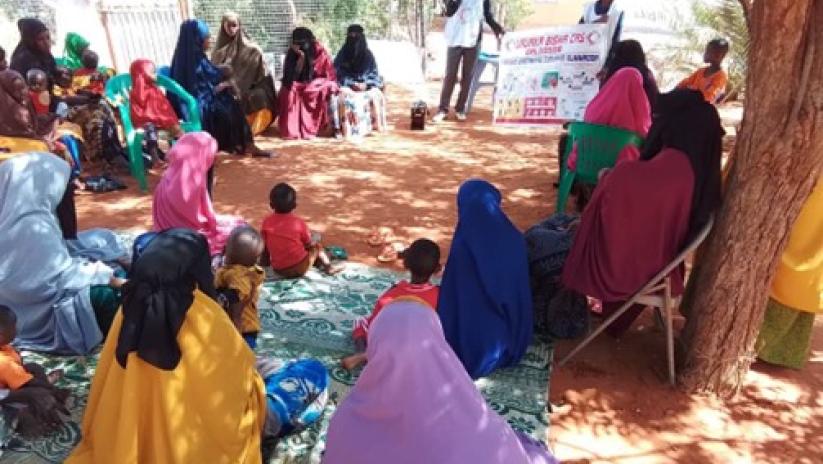
 Somali Red Crescent Society (SRCS) has been implementing Community Based Surveillance (CBS) in several regions in Somalia. In Mudug region, SRCS together with the Norwegian Red Cross established a community health programme in 2020 and included CBS beginning of 2021. Over 100 volunteers have been trained on early detection and warning on potential epidemic diseases.
Somali Red Crescent Society (SRCS) has been implementing Community Based Surveillance (CBS) in several regions in Somalia. In Mudug region, SRCS together with the Norwegian Red Cross established a community health programme in 2020 and included CBS beginning of 2021. Over 100 volunteers have been trained on early detection and warning on potential epidemic diseases.
On 27th of December 2022, a SRCS volunteer based in Ga’nafale village of Galkayo district, Mudug region, reported three cases of people with a fever and rash. The volunteer also noticed that two of the cases showed unusual symptoms that she had not been trained in, like nose bleeding and vomiting with blood. The volunteers immediately sent a CBS report on “unusual illnesses in people” to the Nyss platform and after cross-checking with her supervisor, the alerts were escalated to the Ministry of Health (MoH).
Some months before, a severe Dengue fever outbreak was detected in some areas of the country. SRCS had supported the response, shared experiences and lessons learned. Based on this, SRCS already had discussions with the MoH on an emergency preparedness and response intervention.
The first alerts on suspected Dengue fever were sent from the communities, the same day, SRCS initiated a meeting with MoH. The meeting focused on sharing further information, arrange a joint investigation and plan an effective response to address a potential outbreak.
On 29th December 2022, an outbreak investigation team was sent to Ga’nafale, the village where the reports were sent from. This team consisted of members from the SRCS CBS, the regional, MoH Surveillance Officer and a laboratory technician. Samples were collected from children (test results were negative for Measles). MoH health care workers were able to clinically diagnose children that were showing other symptoms related to dengue fever however, no dengue fever laboratory test was available in Mudug region to further confirm the diagnosis.
During the visit, the community of this village complained about an increase of mosquitos due to the rain season, this led to an increased risk of mosquito borne diseases.
Immediately after the visit, SRCS held meetings with community leaders in the village and surrounding area to facilitate awareness on and to facilitate mosquito control measures to prevent dengue fever. Referrals mechanisms were implemented for serious cases to Galkayo referral hospital from the Primary Health Care Centres (PHCC). SRCS also implemented further emergency response activities to prevent and control the transmission of the disease to other sites and neighbouring villages. Community mobilization through SRCS volunteers at marketplaces or through household visits and messaging through mass media was utilised. Authorities and community leaders were engaged to improve their knowledge of the disease and their skills to prevent it. In addition, a mapping of mosquito breeding sites was conducted by SRCS volunteers and interventions were implemented to reduce and eliminate those sources of mosquitoes.


Above left: Laboratory technician collecting blood samples. Above right: SRCS volunteers mapping and eliminating mosquito breeding sites



